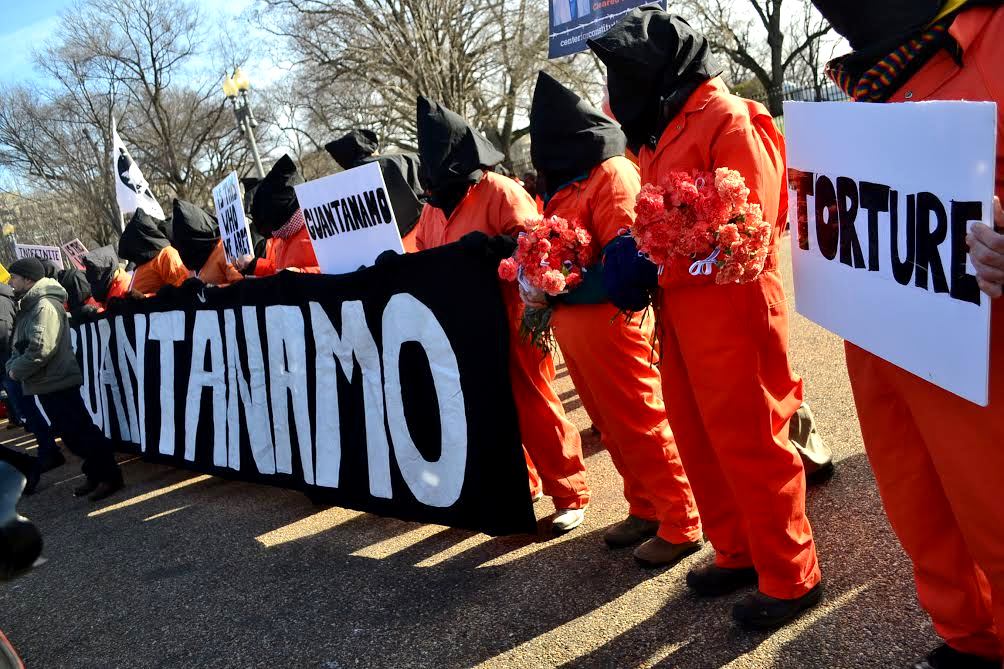






Washington, D.C. January 11, 2016.- On the 14th anniversary of the opening of the Guantanamo Bay detention facility, the Center for Justice and International Law (CEJIL) urges the U.S. government to immediately shut down the detention center in accordance with its international human rights obligations.
Of the 103 men who are currently detained, 44 have been cleared for release. 49 of the men are classified as “indefinite detainees,” a category used for individuals the United States considers ineligible for trial or transfer to a third country. These men will face Periodic Review Board hearings, an interagency process that aims to assess the threat posed by the detainee and determine transfer eligibility. However, this procedure lacks due process guarantees and will likely prolong arbitrary detention.
Additionally, the revelations made by the Senate report on the CIA’s use of torture in 2014 highlight the urgency with which the government must act. This report underscored the Administration’s repeated failure to close Guantanamo, despite promises made years ago. It is unacceptable that many detainees have not been tried by a competent tribunal, and that perpetrators of torture and ill-treatment have not been held accountable.
One clear example of these serious human rights violations is the case of Djamel Ameziane, an Algerian citizen who was held without charge at Guantanamo for nearly 12 years. During his detention, Mr. Ameziane was subjected to physical and psychological torture and other human rights violations. Although the United States conceded in 2009 that there was no rationale for his continued detention, Ameziane was never able to contest his detention in U.S. courts. In December 2013, he was forcibly repatriated to Algeria, from which he had fled violence in the early 1990s, and where he feared persecution based on several factors including his Berber ethnic minority status.
Djamel Ameziane is currently being represented by CEJIL and the Center for Constitutional Rights (CCR) before the Inter-American Commission on Human Rights (IACHR) and awaits a merits report on his petition. If the IACHR rules in favor of Mr. Ameziane, the decision will constitute a landmark decision on the right to judicial remedy and reparations for Guantanamo detainees who were subjected to torture and discrimination.
It is worth noting that in 2006 and 2011, the IACHR issued two resolutions which determined that the U.S. caused irreparable damage to detainees and that Guantanamo must be shut down immediately. In addition, in a joint declaration issued in 2014 by the UN Special Rapporteur on Torture, several other UN agencies, and the Commission, the United States was urged to “adopt all legislative, administrative, judicial, and any other types of measures necessary to prosecute, with full respect for the right to due process, the individuals being held at Guantanamo Naval Base or, where applicable, to provide for their immediate release or transfer to a third country.”
In August 2015, the IACHR published a thematic report titled “Towards the Closure of Guantanamo” that discussed Ameziane’s case at length and detailed widespread human rights violations at Guantanamo. This report was followed in October by a thematic hearing during the IACHR’s 156th period of sessions on the United State Rendition, Detention and Interrogation program and in December by a panel presentation of the report that counted with the participation of CCR attorney Wells Dixon and a United States government representative. While recent repatriations to Ghana, and Kuwait of inmates conducted at the beginning of 2016 (and just today to Saudi Arabia) point to a possible acceleration in transfers, the U.S. has failed to provide a comprehensive closure plan. Fourteen years after the first inmates were transferred to Guantanamo, it now appears unlikely Guantanamo will close before the end of the Obama Administration.
The U.S. must guarantee due process to those who remain in detention and guarantee detainees’ right not to be returned to countries where they fear persecution, torture or ill treatment. Finally, the U.S. must investigate, prosecute and punish those responsible for the torture and ill-treatment of Guantanamo detainees.
¡Ayúdanos a continuar este trabajo crítico y urgente con una donación!
DONA AHORA